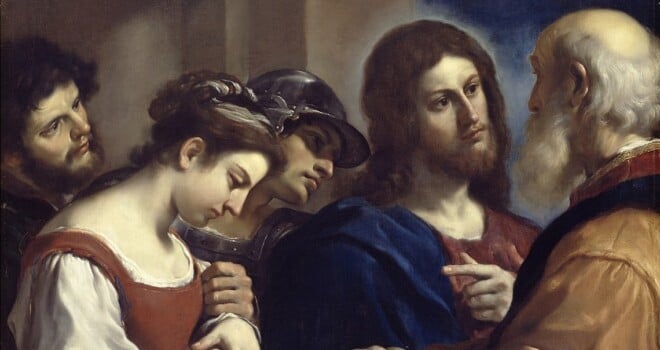For I put water in the desert and rivers in the wasteland for my chosen people to drink, the people whom I formed for myself, that they might announce my praise.
That is part of a very beautiful and very aquatic oracle from Isaiah. Where Isaiah the Prophet wrote about water, John the Apostle wrote about stones.
John wrote how the Pharisees sought to stone a woman caught in the act of adultery. But instead of taking care of this ugly business quietly and discreetly, they hauled the disheveled and humiliated woman into the crowded temple area for everyone to see.
Now, here is a question: How does one go about catching someone in the act of adultery? Adultery is not committed in broad daylight out in the street. No, there has to be some sneaking around and some spying. And maybe some blackmail. Perhaps that is why the man who committed the adultery with the woman was not hauled into the temple with her. He was nowhere to be found. She, and she alone, would be used as the trap to ensnare the preacher from Galilee.
And it seemed like a fool-proof trap, for Christ was a man of the people: he ate with sinners and preached about giving the common man mercy. But where was that mercy if He had allowed this woman to be stoned to death? Conversely, if He said not to stone her, He would have been in defiance of the sacred law of Moses. And claiming to come from God, His defiance would have negated His divinity.
And so, it appeared that the Pharisees had finally trapped Christ.
Scholars tell us this near-stoning episode is seldom found in early ancient codices of the gospels. St. Augustine (c.430 AD) wrote that it was most likely suppressed because early Christians did not want it to appear that Christ was soft on crime. They figured if that were the case, then the Christian populace would go soft on morality. But after some time, a consensus was reached, this dramatic episode was included and placed in what is now the beginning of the 8th chapter of John.
This episode was hardly an isolated incident, however. To get context, perhaps we should go to the end of chapter 6 of John. Recall that after Christ told the crowd they had to eat His body and drink His blood, He lost that crowd and all of His disciples. He in effect went “out of business,” losing all His customers and all His workforce, except for twelve.
Does this sound far-fetched or impossible that God could go out of business? What about all the miracles Christ had performed? What about the feeding of the 5000 with a little fish and bread? Well, people are fickle. And impressionable. Elitists who control the means of communication can use their power of persuasion to get otherwise rational people to believe or disbelieve just about anything.
Jewish leaders no doubt created the narrative that Christ did not miraculously multiply food. Rather, they sold the idea that He merely got people to share their sandwiches with each other. And after it “hit the airwaves” and was drilled into people’s heads by the elitist experts, the people came to believe it as true.
The opening of chapter 7 of John states that Christ’s brethren, which would include some who did not believe in Him (7:5) and some who even tried to kill Him by hurling Him off Nazareth’s cliff, told Christ He needed to go south, to Judea. Since His mission was going nowhere in His home area of Galilee, maybe the more sophisticated big-city atmosphere in Jerusalem would provide the spark He needed to get His mission back on track.
But the first verse of chapter 7 states that Christ refused to go because they wanted to kill Him there too. About half-way through the feast of Tabernacles, a week-long autumn harvest festival, Christ snuck into Jerusalem. He went to the temple and started preaching, and people said, “Isn’t that the man they want to kill?” (7:13).
They marveled at His preaching, but no one said anything about Him “for fear of the Jews.” That is what happens in tyrannical societies. Free speech and free expression get crushed, stoned to death. During one heated exchange with the Pharisees, Christ had to ask them, “Why are you trying to kill me?” (7:19). Can you imagine having to ask people staring at you with murderous hatred in their eyes that question?
What a lonely thing to have to say.
On the last day of Tabernacles, the most solemn day of the feast, there, as always, was a grand procession with the high priest carrying a gold pitcher of water from the Pool of Siloam into the temple to pour over the altar. There he thanked God for watering the crops and prayed that God would be generous with rain next year. Watching the procession go by, Christ shouted out: “If anyone thirsts, come to me! I am the living water!” (7:37). The procession, the gold pitcher, and the water all pointed to Him.
At this the Pharisees sent men to arrest Him. But they returned prisoner-less, saying, “No man has ever spoken like this man.” (7:46). Those officers, men of the people, were mocked by the elitist Pharisees who told them they had been taken in, like the “accursed crowds” who did not know the law.
Chapter 7 ends by stating that the Pharisees went to their homes. But Christ, the homeless man, the man who had no place to lay His head, went up to the Mount of Olives, just east of the temple. Up there He camped out under olive trees. His bed was the ground.
Early the next morning Christ returned to the temple, and while teaching, the Pharisees rushed at Him with the adulterous woman. After He destroyed their plans and saved the woman’s life, the Pharisees left, but only to return later. After a brutal exchange where Christ called the Pharisees liars and sons of the devil, the Jews picked up rocks to stone Him. But John wrote how Christ hid Himself and went out of the temple.
This passage from the end of chapter 8 about Christ hiding and departing the temple was traditionally read every year on the 5th Sunday of Lent. That is where the custom started of veiling crucifixes and statues on what became Passion Sunday, hiding them from our eyes, and keeping them covered until the Vigil for Easter.
Remember not the events of the past,
the things of long ago consider not;
see, I am doing something new!
Now it springs forth, do you not perceive it?
In the desert I make a way.
That was Isaiah’s prophecy that the hard-hearted Jewish leaders, the elitists, could not perceive. They could not see that something new was happening. Christ did not come to destroy the Law of Moses, but to complete it. He told the Pharisees, “You want to bash this woman’s head in? Go ahead. Whoever has no sin can throw the first stone.” Christ had not violated the law, but penetrated its essential spirit.
The essential of every honest law can only be to divert from evil and direct toward good. Justice had been sublimated by mercy. (Ricciotti)
And so here you are today, living in a hard-hearted world that has gone soft on morality; a world where Christ’s Church seems to be going out of business, having lost many of its customers and workforce. What are you to do?
In the silence, think on your sins, and listen for the loneliest man in the world to ask you a question. Listen to Him ask, “Why are you trying to kill me?” That question should break your heart and haul you into the confessional where you can fall at His feet and beg for mercy. In there He is generous with the rain that flows from His pierced side, the rain He has given you, one of His chosen people to drink.
So, drink this rain, this living water. And strengthened with this divine refreshment, go and sin no more.
Image from Wikimedia Commons














